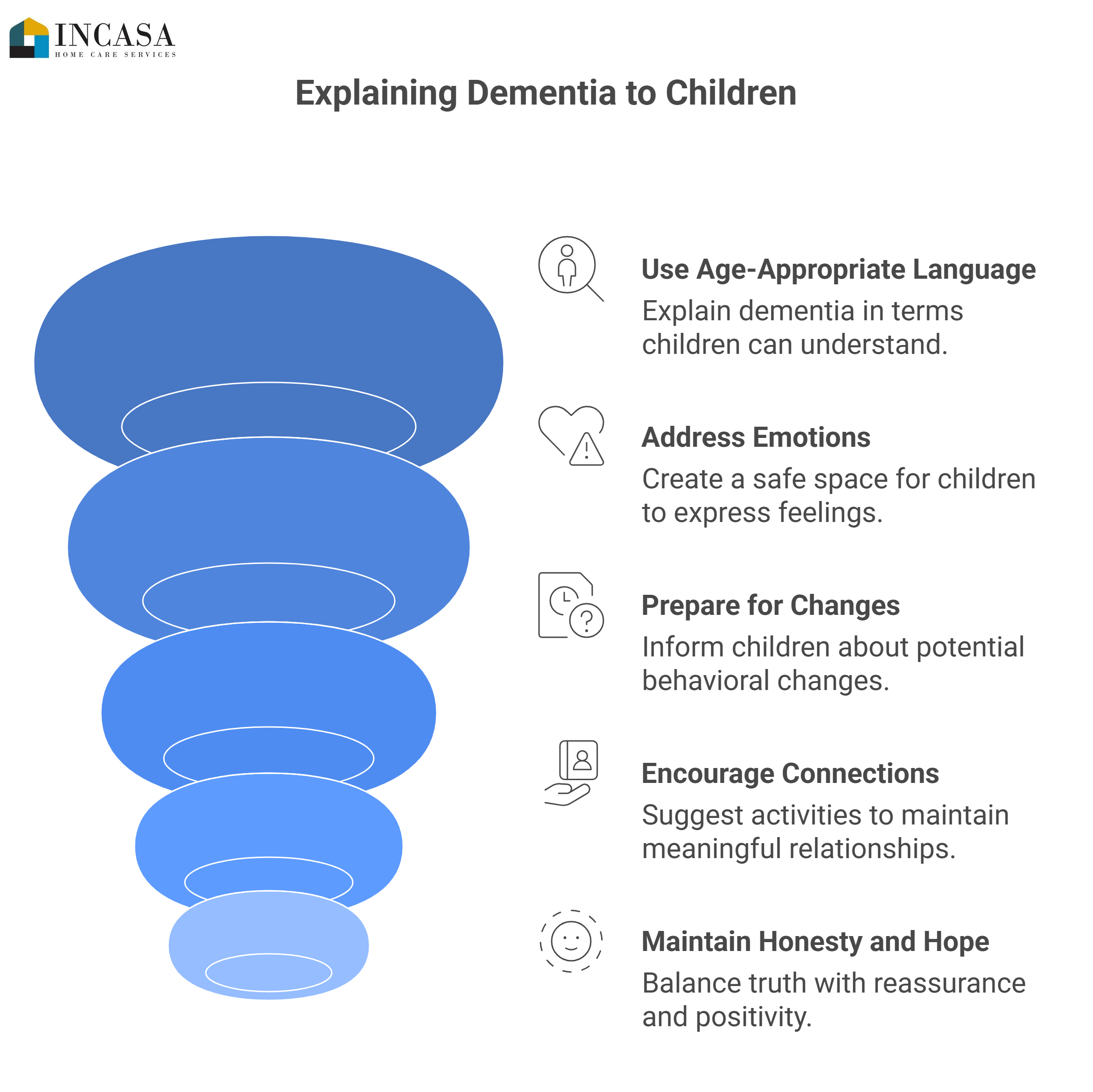When a grandparent or other senior family member develops dementia, children often feel confused and frightened by the changes they observe. Explaining this complex condition requires patience, age-appropriate language, and honest conversations that help young minds process what’s happening to someone they love.
Use Simple, Age-Appropriate Language
Children need clear explanations that match their developmental stage. For younger children (ages 4–7), describe dementia as “an illness that makes it hard for Grandma to remember things.” Older children (ages 8–12) can understand more detailed explanations about how the brain works and what happens when dementia affects memory and thinking.
Key points to cover include:
- The brain controls memory, thinking, and behaviour.
- Dementia makes these functions work differently.
- It’s not contagious and not the child’s fault.
- The person still loves them, even when he or she seems confused.
Avoid using scary words like “deteriorating” or “losing their mind.” Instead, focus on concrete examples your children can understand.
An experienced professional caregiver can help you create ways to explain your loved one’s dementia to your children. If your senior loved one has been diagnosed with a serious condition and needs help with tasks like meal prep, transportation, bathing, and grooming, reach out to InCasa Home Care Services, a leading provider of in-home care families can trust. We also offer comprehensive care for seniors with dementia, Alzheimer’s, and Parkinson’s.

Address Their Emotions and Concerns
When witnessing dementia’s effects, children experience a range of emotions, such as sadness, anger, fear, or embarrassment. Create a safe space for them to express these feelings without judgment.
Common concerns children have include:
- Fear that they might “catch” dementia
- Worry that they caused the illness somehow
- Confusion about why their loved one acts differently
- Sadness about losing the relationship they once knew
Validate their emotions by saying things like “It’s normal to feel sad when Grandpa doesn’t remember your name” or “Many kids feel scared when someone they love changes.”
Prepare Them for Behavioural Changes
Dementia can cause unpredictable behaviours that may frighten or confuse children. Prepare them in advance for what they might see during visits.
Explain potential changes such as:
- Repeating the same questions or stories
- Not recognizing familiar people
- Getting upset or agitated easily
- Needing help with basic tasks like eating or dressing
- Saying things that don’t make sense
Help your children understand these behaviours aren’t intentional. You might say “Sometimes Uncle Joe’s brain gets mixed up, so he might ask the same question many times. He’s not doing it on purpose.”
Consider hiring a professional caregiver if you need someone to provide care to your loved one. There are many reasons seniors might need assistance at home. Some may require regular mental stimulation due to a dementia diagnosis, while others might only need part-time assistance with exercise and basic household tasks. InCasa Home Care Services is a leading Edmonton at-home care provider. Families rely on our expertly trained caregivers to help their senior loved ones maintain a high quality of life.
Encourage Meaningful Connections
Despite the cognitive changes that accompany dementia, children can still form meaningful connections with their loved ones. Help them find new ways to relate and communicate.
Suggest activities that don’t rely heavily on memory or complex conversation:
- Looking through old photo albums together
- Listening to familiar music from your loved one’s younger years
- Doing simple crafts or puzzles
- Taking gentle walks outdoors
- Sharing hugs and physical affection
Teach your children to follow your loved one’s lead in conversations and to be patient when communication becomes difficult. Remind them that their presence alone brings comfort, even when verbal interaction is limited.
Maintain Honesty while Providing Hope
Balance truthfulness with age-appropriate hope. Children need to understand that dementia typically worsens over time, but they also need reassurance about what remains constant.
Be honest about:
- The progressive nature of the condition
- Changes they can expect to see
- The fact that there’s currently no cure
Provide hope through:
- Emphasizing the love that continues despite memory loss
- Highlighting moments of connection and joy
- Discussing how family members support each other
- Focusing on making the most of good days
Remember your children may need multiple conversations as they process this information and as the condition progresses. Keep communication open and check in regularly about how they’re feeling and what questions they have.
An experienced dementia caregiver can be a wonderful source of information and support for your whole family. Even when families have the best intentions, caring for a senior loved one with dementia can be challenging. Fortunately, InCasa Home Care Services is here to help. We are a leading provider of home care. Edmonton families can take advantage of our flexible and customizable care plans, and our caregivers always stay up to date on the latest developments in senior care. To learn about our quality-assured services, give us a call today.



Recent Comments